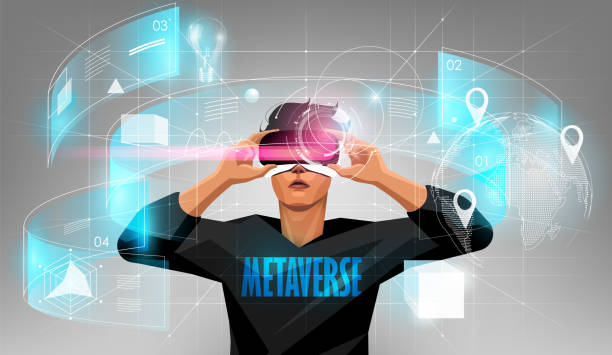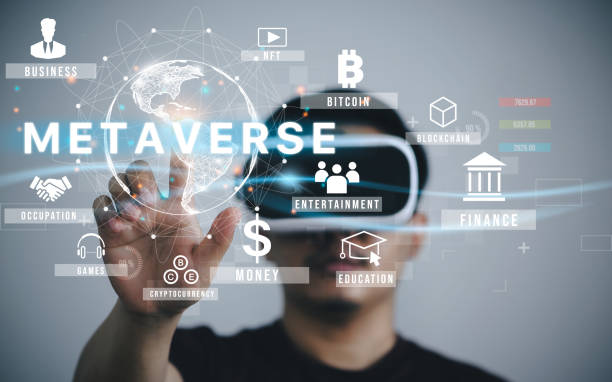The Metaverse is one of these emerging technologies to elevate human connection online to an entirely new level. It is a virtual world connected by servers that allow users to communicate with one another over the internet while in a virtual setting. Whether or not the initiative will change the way developers and programmers work is an open question. It’s likely that this new digital area will become a part of our everyday lives in the near future, allowing people to conduct business, establish virtual homes, and basically create an entirely new universe. Keep reading to learn more about this topic in greater depth.
The Technologies You Will Need to Acquire to Work in the Metaverse
You’ll need to be familiar with various technologies if you want to create metaverse-based applications. You don’t need to know how everything works to create digital products, although some technologies, like AI and VR, will become commonplace.

VR (Virtual Reality)
As stated at the beginning of this post, virtual reality development abilities are necessary. This includes the ability to create VR content with the resources that are now accessible. To get into the metaverse you’ll need talents like VR creation, 3D modeling, video editing, and wearable experience.
AI (Artificial Intelligence)
You’ll require AI application development abilities if you want to create a robust application for the metaverse. User interaction with AI-powered avatars calls for it, as does the security of their personal information.
To construct and deploy AI models in the Metaverse, Metaverse developers must be fluent in C++, Python, Java, and R. Big data technologies like Hadoop, Apache Spark, Cassandra, and MongoDB are also required expertise.
ML methods like KNN, naive Bayes, linear regression, and support vector machines would also benefit from this course. AI frameworks like PyTorch, Caffe, Theano, and TensorFlow require metaverse designers’ knowledge.
They should also be familiar with deep learning (DL) algorithms such as generative adversarial, convolutional, and recurrent neural networks.
Quantum computing has already made significant achievements in elementary areas that have commercial applications. Since ML/DL traditional computing algorithms (CCA) have hardware restrictions and must be supplemented by quantum computing algorithms (QCA) to address complicated difficulties, the research shows the need for QCA.
Virtual or Augmented Realities (XR or MX)
Any virtual environments must support AR, XR, and MX realities you create for your users to engage with. This is Pokemon GO on a whole new level! E-commerce is an area where you can experiment with different business ideas, especially with MX and XR. Some examples include virtual clothing fittings and virtual driving simulations.
Non-Fungible Token Technologies

Skills in NFT development are essential when working with Web3. This is due to the fact that NFTs allow for seamless switching between servers. Everything in the metaverse, including avatars, items, talents, and buildings, will be implemented as NFTs.
The NFTS will be in charge of ensuring that metaverse identities are maintained. It’s an excellent method for determining ownership of digital goods. As a result, developers must be knowledgeable about the web3, smart contracts, blockchain, and so on. Programming languages such as JSON, JavaScript, and Solidity should be familiar to software engineers.
Distributed Storage and Computing
The metaverse requires a lot of computer power and storage thus having some knowledge of the subject matter will be helpful in avoiding crashes or disruptions. As a result, you should be familiar with distributed computations and storage concepts across numerous computers.
You can also become a metaverse application developer if you have any of the following skills: game development, animation, HTML, CSS, Node.js, SQL, MySQL, and Unity. Thanks to its vastness and variety of factors, there’s something for everyone in the metaverse.
Be Prepared to Create a Metaverse
The metaverse is still in its infancy, so expect a slew of new technologies to emerge in the years to come. To keep up with the ever-changing landscape of the metaverse, you must always be ready to learn new things.
As you can see, there is a metaverse relationship no matter what you’re doing in the software development area. If you’re seeking work in the metaverse, you’ll need the perfect mix of technical skills and knowledge to succeed.
Future Jobs in the Metaverse

Scientists in the Metaverse
Top universities and major IT firms currently employ many AR and VR researchers. However, when the Metaverse gets more commonly acknowledged, we’ll need more brainpower to deal with it.
If you want to become a Metaverse Research Scientist, you’ll have to do more than create a few rudimentary digital models of the real world. This has already been accomplished. The scope of the future is greater. Much more. Scientists in the field of metaverse research will need to develop something like a “theory of everything,” in which the entire universe is made digitally accessible and actionable.
Metaverse Planner
The price of ideas can’t be overstated. The cost of carrying out a project is high. Most firms will need the ability to plan and implement all capabilities into a virtual environment once we have a working Metaverse. Choosing the correct things to do in this ever-expanding digital world will be equally important.
The Metaverse Planner comes into play here. Planned prospects will need to be taken from concept to pilot or deployment by the Planner as CEOs develop a vision and plan for the growth of their business’s metaverse revenues.
Builder of Metaverse Hardware
We won’t just rely on the written word to build the Metaverse. Sensors, cameras, and headsets will all be used in its construction. Sensors that detect when your arm is squeezed online. As a result of these cameras, the AI will not irritate you as much. Immersive virtual reality headsets allow you to feel the sun on your face and display a summer day in the digital world. And that’s without even going into the more mundane aspects of tracking, mapping, and localization, such as inertial measurement units, depth cameras, and visible light cameras.
Storyteller of the Metaverse
As the experience economy and gamification grow in popularity, it’s only natural that we expect our virtual reality experiences to have compelling narratives from which we may draw important lessons. We’d like to have a good time. The tears just flow. We’re here to gain knowledge. In the digital age, we want to see little wonky things. The Metaverse Storyteller comes into play here.
Many new technologies, protocols, enterprises, breakthroughs, and discoveries will be required to make the Metaverse work. There are bound to be many individuals involved in this endeavor, and they’ll need to put in countless hours.
If you’re fortunate enough to land one of these positions in the near future, keep in mind that the world is gloomy. That gloom should not accompany you into the Metaverse.
